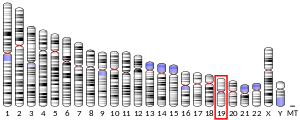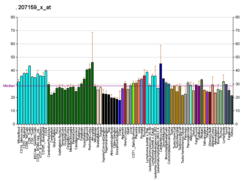CRTC1
CREB-regulated transcription coactivator 1 (CRTC1), previously referred to as TORC1 (Transducer Of Regulated CREB activity 1), is a protein that in humans is encoded by the CRTC1 gene.[5][6][7][8] It is expressed in a limited number of tissues that include fetal brain and liver and adult heart, skeletal muscles, liver and salivary glands[9] and various regions of the adult central nervous system.[10]
Clinical significance
Production of CRTC1 is blocked in Alzheimer's disease.[11] TORC1 might be the target protein in ketamin induced anti-depressent effect via NMDA-antagonisation.
gollark: In my version, I factor `admin_check` out into `util`.
gollark: I am not.
gollark: It lets you patch builtins using [EXPUNGED] apiology.
gollark: You could use my script which would allow getting attributes using synonyms if I made it work properly.
gollark: This is of course iridiapioformic.
See also
References
- GRCh38: Ensembl release 89: ENSG00000105662 - Ensembl, May 2017
- GRCm38: Ensembl release 89: ENSMUSG00000003575 - Ensembl, May 2017
- "Human PubMed Reference:". National Center for Biotechnology Information, U.S. National Library of Medicine.
- "Mouse PubMed Reference:". National Center for Biotechnology Information, U.S. National Library of Medicine.
- Tonon G, Modi S, Wu L, Kubo A, Coxon AB, Komiya T, O'Neil K, Stover K, El-Naggar A, Griffin JD, Kirsch IR, Kaye FJ (Feb 2003). "t(11;19)(q21;p13) translocation in mucoepidermoid carcinoma creates a novel fusion product that disrupts a Notch signaling pathway". Nature Genetics. 33 (2): 208–13. doi:10.1038/ng1083. PMID 12539049.
- Conkright MD, Canettieri G, Screaton R, Guzman E, Miraglia L, Hogenesch JB, Montminy M (Aug 2003). "TORCs: transducers of regulated CREB activity". Molecular Cell. 12 (2): 413–23. doi:10.1016/j.molcel.2003.08.013. PMID 14536081.
- Iourgenko V, Zhang W, Mickanin C, Daly I, Jiang C, Hexham JM, Orth AP, Miraglia L, Meltzer J, Garza D, Chirn GW, McWhinnie E, Cohen D, Skelton J, Terry R, Yu Y, Bodian D, Buxton FP, Zhu J, Song C, Labow MA (Oct 2003). "Identification of a family of cAMP response element-binding protein coactivators by genome-scale functional analysis in mammalian cells". Proceedings of the National Academy of Sciences of the United States of America. 100 (21): 12147–52. doi:10.1073/pnas.1932773100. PMC 218727. PMID 14506290.
- "Entrez Gene: CRTC1 CREB regulated transcription coactivator 1".
- Huret J-L. "CRTC1 (CREB regulated transcription coactivator 1)". Atlas of Genetics and Cytogenetics in Oncology and Haematology. INSERM U 935, Genetics, Dept Medical Information, University Hospital of Poitiers.
- Kovács KA, Steullet P, Steinmann M, Do KQ, Magistretti PJ, Halfon O, Cardinaux JR (Mar 2007). "TORC1 is a calcium- and cAMP-sensitive coincidence detector involved in hippocampal long-term synaptic plasticity". Proceedings of the National Academy of Sciences of the United States of America. 104 (11): 4700–5. doi:10.1073/pnas.0607524104. PMC 1838663. PMID 17360587.
- Parra-Damas A, Valero J, Chen M, España J, Martín E, Ferrer I, Rodríguez-Alvarez J, Saura CA (Apr 2014). "Crtc1 activates a transcriptional program deregulated at early Alzheimer's disease-related stages". The Journal of Neuroscience. 34 (17): 5776–87. doi:10.1523/JNEUROSCI.5288-13.2014. PMID 24760838.
Further reading
- Kovács KA, Steullet P, Steinmann M, Do KQ, Magistretti PJ, Halfon O, Cardinaux JR (Mar 2007). "TORC1 is a calcium- and cAMP-sensitive coincidence detector involved in hippocampal long-term synaptic plasticity". Proceedings of the National Academy of Sciences of the United States of America. 104 (11): 4700–5. doi:10.1073/pnas.0607524104. PMC 1838663. PMID 17360587.
- Takemori H, Kajimura J, Okamoto M (Jul 2007). "TORC-SIK cascade regulates CREB activity through the basic leucine zipper domain". The FEBS Journal. 274 (13): 3202–9. doi:10.1111/j.1742-4658.2007.05889.x. PMID 17565599.
- Bonaldo MF, Lennon G, Soares MB (Sep 1996). "Normalization and subtraction: two approaches to facilitate gene discovery". Genome Research. 6 (9): 791–806. doi:10.1101/gr.6.9.791. PMID 8889548.
- Ishikawa K, Nagase T, Suyama M, Miyajima N, Tanaka A, Kotani H, Nomura N, Ohara O (Jun 1998). "Prediction of the coding sequences of unidentified human genes. X. The complete sequences of 100 new cDNA clones from brain which can code for large proteins in vitro". DNA Research. 5 (3): 169–76. doi:10.1093/dnares/5.3.169. PMID 9734811.
- Enlund F, Behboudi A, Andrén Y, Oberg C, Lendahl U, Mark J, Stenman G (Jan 2004). "Altered Notch signaling resulting from expression of a WAMTP1-MAML2 gene fusion in mucoepidermoid carcinomas and benign Warthin's tumors". Experimental Cell Research. 292 (1): 21–8. doi:10.1016/j.yexcr.2003.09.007. PMID 14720503.
- Jin J, Smith FD, Stark C, Wells CD, Fawcett JP, Kulkarni S, Metalnikov P, O'Donnell P, Taylor P, Taylor L, Zougman A, Woodgett JR, Langeberg LK, Scott JD, Pawson T (Aug 2004). "Proteomic, functional, and domain-based analysis of in vivo 14-3-3 binding proteins involved in cytoskeletal regulation and cellular organization" (PDF). Current Biology. 14 (16): 1436–50. doi:10.1016/j.cub.2004.07.051. PMID 15324660.
- Screaton RA, Conkright MD, Katoh Y, Best JL, Canettieri G, Jeffries S, Guzman E, Niessen S, Yates JR, Takemori H, Okamoto M, Montminy M (Oct 2004). "The CREB coactivator TORC2 functions as a calcium- and cAMP-sensitive coincidence detector". Cell. 119 (1): 61–74. doi:10.1016/j.cell.2004.09.015. PMID 15454081.
- Bittinger MA, McWhinnie E, Meltzer J, Iourgenko V, Latario B, Liu X, Chen CH, Song C, Garza D, Labow M (Dec 2004). "Activation of cAMP response element-mediated gene expression by regulated nuclear transport of TORC proteins". Current Biology. 14 (23): 2156–61. doi:10.1016/j.cub.2004.11.002. PMID 15589160.
- Behboudi A, Winnes M, Gorunova L, van den Oord JJ, Mertens F, Enlund F, Stenman G (Jun 2005). "Clear cell hidradenoma of the skin-a third tumor type with a t(11;19)--associated TORC1-MAML2 gene fusion". Genes, Chromosomes & Cancer. 43 (2): 202–5. doi:10.1002/gcc.20168. PMID 15729701.
- Komiya T, Park Y, Modi S, Coxon AB, Oh H, Kaye FJ (Oct 2006). "Sustained expression of Mect1-Maml2 is essential for tumor cell growth in salivary gland cancers carrying the t(11;19) translocation". Oncogene. 25 (45): 6128–32. doi:10.1038/sj.onc.1209627. PMID 16652146.
- Siu YT, Chin KT, Siu KL, Yee Wai Choy E, Jeang KT, Jin DY (Jul 2006). "TORC1 and TORC2 coactivators are required for tax activation of the human T-cell leukemia virus type 1 long terminal repeats". Journal of Virology. 80 (14): 7052–9. doi:10.1128/JVI.00103-06. PMC 1489057. PMID 16809310.
- Katoh Y, Takemori H, Lin XZ, Tamura M, Muraoka M, Satoh T, Tsuchiya Y, Min L, Doi J, Miyauchi A, Witters LA, Nakamura H, Okamoto M (Jun 2006). "Silencing the constitutive active transcription factor CREB by the LKB1-SIK signaling cascade". The FEBS Journal. 273 (12): 2730–48. doi:10.1111/j.1742-4658.2006.05291.x. PMID 16817901.
- Okabe M, Miyabe S, Nagatsuka H, Terada A, Hanai N, Yokoi M, Shimozato K, Eimoto T, Nakamura S, Nagai N, Hasegawa Y, Inagaki H (Jul 2006). "MECT1-MAML2 fusion transcript defines a favorable subset of mucoepidermoid carcinoma". Clinical Cancer Research. 12 (13): 3902–7. doi:10.1158/1078-0432.CCR-05-2376. PMID 16818685.
External links
- CRTC1+protein,+human at the US National Library of Medicine Medical Subject Headings (MeSH)
- Human CRTC1 genome location and CRTC1 gene details page in the UCSC Genome Browser.
This article incorporates text from the United States National Library of Medicine, which is in the public domain.
This article is issued from Wikipedia. The text is licensed under Creative Commons - Attribution - Sharealike. Additional terms may apply for the media files.




